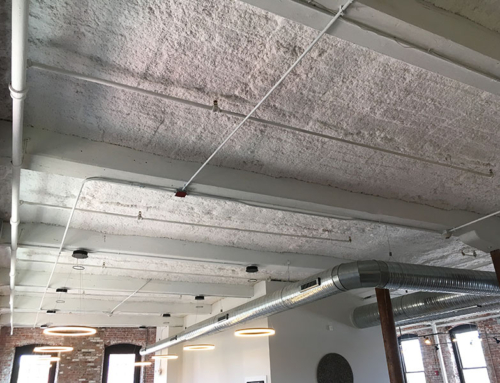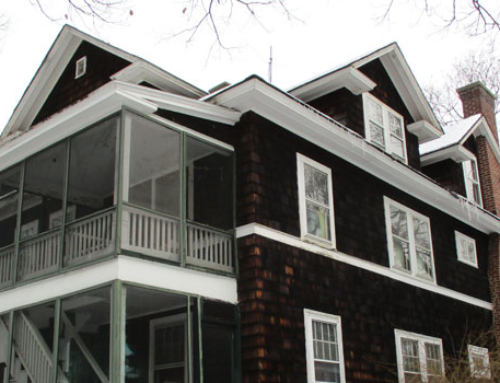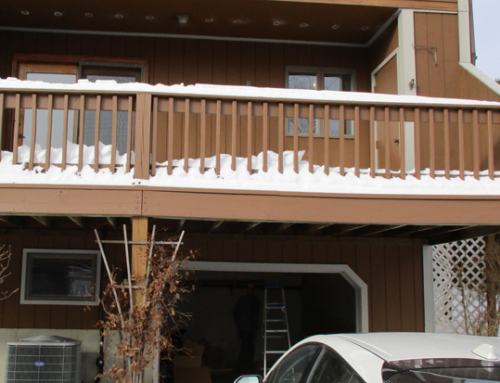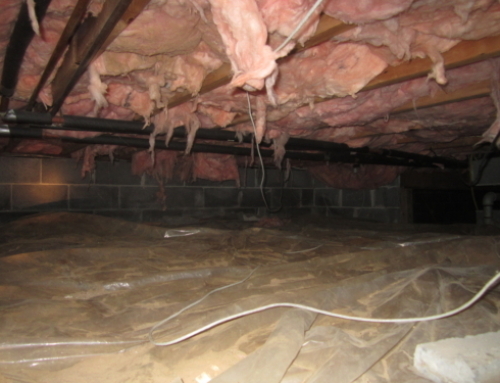Meditations on a Mass Save ‘Screening Assessment’
I just bought a home with my fiance in Northampton: IMHO, the best ‘city’ in all of Massachusetts. The house is a 1900s with hollow balloon framed walls and a beast of an oil steam ‘tankless’ heating system: there is a lot of opportunity (1700 sq ft. 3500 CFM50) as we like to say. On a positive note, the house has good ‘bones’ : no moisture issues, no ‘barriers’ (asbestos, mold, k/t, structural issues). It was a bargain and we are a stone throw from the bike-path and a thriving downtown artsy commercial district (read: espresso)
Yesterday we had our National Grid Mass Save screening audit done by CET (Center for Ecological Technology)- sub-contracted under CSG (Conservation Services Group). The ‘screening audit’ comes before the ‘diagnostic audit’ and is designed to identify opportunities for improving insulation and air barrier, any ‘roadblocks’, and install ‘instant savings measures’, mainly CFLs. I have been working with, alongside, in competition with, under and over the Mass Save program for several years now. Here are some initial thoughts on the Screening audit:
I was very impressed by my Assessment Provider’s knowledge and skills! Frank has over 1.5 years experience as an energy auditor and air sealer with CET- he was professional, knew the BPI protocol like the back of his hand (adjusted accordingly to meet the RCS program ‘realities’), and most importantly connected with me as the homeowner to build trust, gauge my goals, and responded to my questions both about the audit process and program intricacies with humility and respect. A notable detail that shows Frank’s professionalism as an Assessment Provider is that he insisted to install all of the CFL light-bulbs himself- even though I promised to do them myself so he could leave and end his day a little earlier.
CET already stands out in my mind as the leading Mass Save RCS Lead Vendor; what I saw yesterday furthers this conviction. With this said, structure of the Screening visit has weaknesses- cost effective energy saving measures were not identified resulting in energy savings missed. The issues have to do with air-sealing recommendations, a perceived road-block , and heating system improvement consideration. It is important to acknowledge that the issues I had with my screening audit have to do with the Mass Save structure, not CET; the Utility companies and perhaps DPU have the responsibility to address these issues.
A perceived Road-Block adds unnecessary cost to my insulation.
I was not able to schedule a ‘diagnostic audit’, where much needed recommendations for additional insulation are given because ‘indications of knob and tube’ were found. The wiring was all recently updated by the previous owner. The ‘indications of k/t’ are several hollow ceramic ‘knobs’ observed in the basement. So to proceed with the second site visit I have to hire an electrician to sign off on the fact that there is absolutely no k/t in the house. The first two electricians I called were very hesitant and implied they would overcharge me to take on the liability.
Question for the PAs and DPU: Is the $300+ fee an electrician to sign the form factored into the ‘cost effectiveness’ of the improvement measures?
A Home Performance model, would put the responsibility on the auditor/ install contractor to make the determination that k/t is null. If there are real signs that k/t is active, then yes it is very important to have licensed electrician remediate, even in the midst of remediation. However, a skilled contractor can determine when the wiring has been updated and assume the risk.
Air sealing hours too few- no recommendation to go beyond program limits.
It was estimated that I need 8 hours of air sealing. Note that this is 8 ‘man-hours’, not 8 hours of an air sealing crew on sight. Furthermore, the 8 hours includes air-leakage diagnostics that can take upward of 2 hours. Prior to Frank arriving,I had removed all the interior trim of the old windows exposing the hollow pulley wheel cavities, so Frank could see how easy it would be to seal in these leaky crevices. This measure in addition to sealing top plates, fixtures, and bypasses in the two attic spaces, and basic targeted interior sealing, would take at least 12 hours of time. There was not an option communicated to pay for this additional time. If I was a typical Mass Save customer, I would assume that all cost-effective air sealing would have been recommended. (I intend to take multiple blower door readings through the air sealing process to determine the effectiveness of the various levels of air sealing)
Heating System recommendations limited by fuel and distribution type- additional options should be presented to ‘serious’ homeowners.
I have a beast of a system that passed spillage and CO. It was measured to be 75% ‘steady state’ efficient. (not AFUE, which would lower the efficiency) Frank appropriately identified the priority to replace the heating system. However, due to utility liability or perceived needs or something beyond me, he was not able to share with me the benefits of changing fuel types. I will be replacing the oil fired steam beast with a direct vented hot water gas 92%+ efficient boiler and indirect tank. All the steam pipes will be replaced with modern pex tubing leading to modern panel radiators. This is sizable and costly project, yet is an important step to making my house optimally efficient.
The Mass Save Assessment provider should present the potential for installing a more efficient system. Just replacing the oil boiler, it would be impossible to achieve efficiency beyond 85%. With a gas boiler h20 system, I can achieve over 92+% easily. Payback for this investment is not going to be short, but increased home value, ability to zone, and Bay State Gas incentives lure me. Also I try to live by the adage: if you do it, do it right the first time. Frank left me with no information about the benefits of gas boilers over oil boilers: he couldn’t even talk about it.
The ‘house-as-a-system’ model for energy efficiency improvements, as Mass Save RCS strives to be, should acknowledge all options for heating system improvement. Indeed this is necessary if we are going to achieve deeper energy savings in Massachusetts homes.
All the issues above have a similar solution: Allow qualified Home Performance contractors to have a strong relationship with the Mass Save customer and make space for Assessment recommendations that go beyond incentive eligible measures to acheive deeper savings.
Mass Save RCS is continuing to evolve. Cozy Home Performance is eagerly awaiting contracts from Lead Vendors in Western MA so we can feed our clients into the Mass Save program. July 1 marked the start of another milestone; time will tell how the program evolves to get closer to the goal of ‘achieving all cost effective energy efficiency’.








